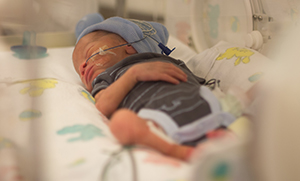Dr. Shawn O’Connor
Meet Shawn O’Connor, MD, a neonatologist with Washington University Physicians in Illinois, Inc.
Talk about your background and education.
I was actually born in Orlando, Florida, and then in the early ’90s my family moved to Atlanta, Georgia. I attended school at the University of Georgia as a Bulldog and then went to the Medical College of Georgia. After graduating, I moved to the St. Louis area to attend pediatric and neonatology training at Wash University St. Louis Children’s Hospital.
Why did you choose to become a neonatologist?
When I was in medical school, I knew I always wanted to do pediatrics, so that was the easy decision. After graduating from medical school, one of my first rotations as a pediatrician was on labor and delivery. It was the very first month after graduating, and I really got addicted then but didn’t know it for maybe another like six months to a year that everything was getting compared to this job. The excitement, the unknown, the adrenaline rush of getting called in the middle of the night for a baby that needs your help is addicting. The group of colleagues that I work with shares the feeling that there’s nothing better than helping a newborn baby get home with their family, ready to explore whatever is out there for them.
What do you enjoy most about what you do?
The thing I enjoy most relates back to something my old mentor used to tell me. If you think about births in general, birth is something in both our culture and cultures across the world that is a very private moment. Not anybody other than very close family members are allowed to be present most of the time. Over my career, we are there for what is one of the most private moments of a family’s life. To be able to help them and become part of that family, to go through the trials and tribulations of the days to weeks to come, and then celebrate the success at the end of it, that’s what makes it all worth it.
Do you have a success story to share?
I see kids both in the hospital and part of a developmental follow-up clinic to track what happens to these babies long term and to anticipate problems. I can remember one of my very first as a trainee getting called at two o’clock in the morning. We meet this family, and we always joke, “Hey, we hope not to see you anytime soon for many, many weeks, but in case you’re ready, we’ll be ready for your birthday party.” It wasn’t maybe two hours later that we get called back and this mom ends up delivering her infant at 24 weeks prematurely and then spends the next four or five months in the neonatal intensive care unit…learning how to breathe on your own, learning how to eat on your own, learning how to keep your temperature up on your own. Then I actually had the opportunity to hear how this baby was doing because they came to the emergency department where my wife was working. They recognized the last name, and so they got talking. My wife told me how they were doing, and I ended up seeing them in the clinic where, to be honest, I can’t even tell as a specialist that this baby has any problems whatsoever. That’s what we’re really hoping for. We can’t predict whether or not you’re going to have problems or not, but we do everything really in our power to make sure we limit as much of that as we can.


